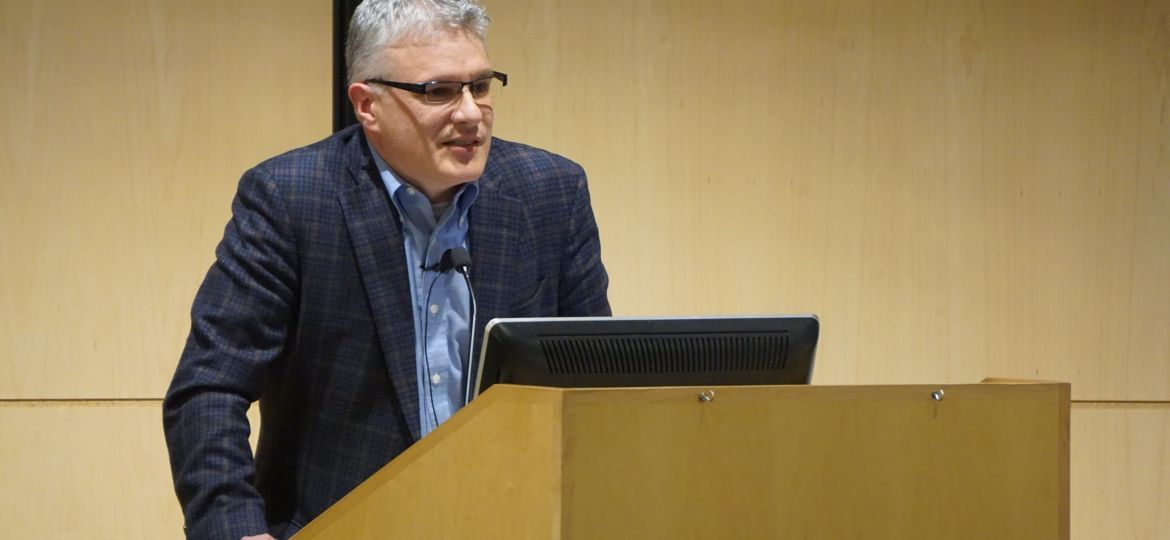
St. Olaf Associate Professor of Chemistry and Environmental Studies and chair of Environmental Studies Paul Jackson ’92 delivered the spring Mellby Lecture on Tuesday, April 9.
The lecture, titled “Conversations with Neighbors: Shifting the Paradigm of Chemical and Environmental Sustainability from Local to Global and Back Again,” was part of the 36th annual Mellby Lecture series.
The Mellby Lectures are an annual two-part series that commemorate former St. Olaf faculty member Carl A. Mellby and his contributions to the College. Mellby was a professor and administrator at St. Olaf from 1901 to 1949. He taught courses in the languages, social sciences and religion, and developed the college’s honor system. Mellby introduced courses in economics, sociology, political science and art history to the College.
Jackson’s lecture was the second in the two part annual series. St. Olaf Professor of English Jennifer Kwon Dobbs delivered the first part in her fall lecture “Race, Citizenship Regimes, and Intercountry Adoption from the South Korean Kijich’on to the U.S.-Mexico Border in the Era of Trump.”
The lecture series allows St. Olaf professors and faculty to share their unique research with the St. Olaf community while commemorating Mellby’s life and work. The series was established in 1983, with the initial lecture delivered by former St. Olaf Professor of Mathematics Lynn Steen.
“The lecture series provides the community with an opportunity to pause, to reflect, to celebrate and to imagine possibilities that arise in liberal arts learning,” Jackson wrote in an email. “I’ve deeply appreciated the prior stories that the Mellby Lecture captured and I look forward to many more. It’s an honor to have this opportunity.”
The central theme of the lecture was the concept of sustainability at both the local and global level.
Jackson explained the boundless challenge that environmental pollution poses to humans, and how it is often difficult to realize sustainable answers.
“How do we expect to start somewhere and then get somewhere, in something that has no bounds?” Jackson said.
He provided a framework for sustainability by urging that we start at the local level, move to the global level and then return to the local with a new global perspective.
For each of these distinct parts, Jackson provided real-world examples. For the local level, Jackson explained the work he and his team are doing to heal, protect and intervene in the Rice Creek Watershed with the help of a local concerned citizens group.
At the global level, Jackson used the Asian Rural Institute in Nasushiobara, Japan to show how citizens around the world are developing sustainable solutions to problems. The Institute is looking to use fungi to sustainably alter the effects of radioactive decay.
Jackson returned locally by analyzing St. Olaf campus electrical usage and how the wind turbine ‘Big Ole’ provides for the campus. He said that the wind turbine contributes approximately 20 percent of the campus’ overall energy use. He urged that St. Olaf should look to decrease energy production and make Big Ole a more efficient sustainable solution for energy needs.
“In a world filled with uncertainties, the ability to connect meaningfully with one another is vital to addressing those challenges,” Jackson said. “By taking time to attend to the particulars in a specific locale, it enables us to see and to find our place within it and understand our interdependence in new or different ways. It is also a story about how we, the St. Olaf community, need to come together around common ideals, especially those related to the topic of environmental sustainability.”









